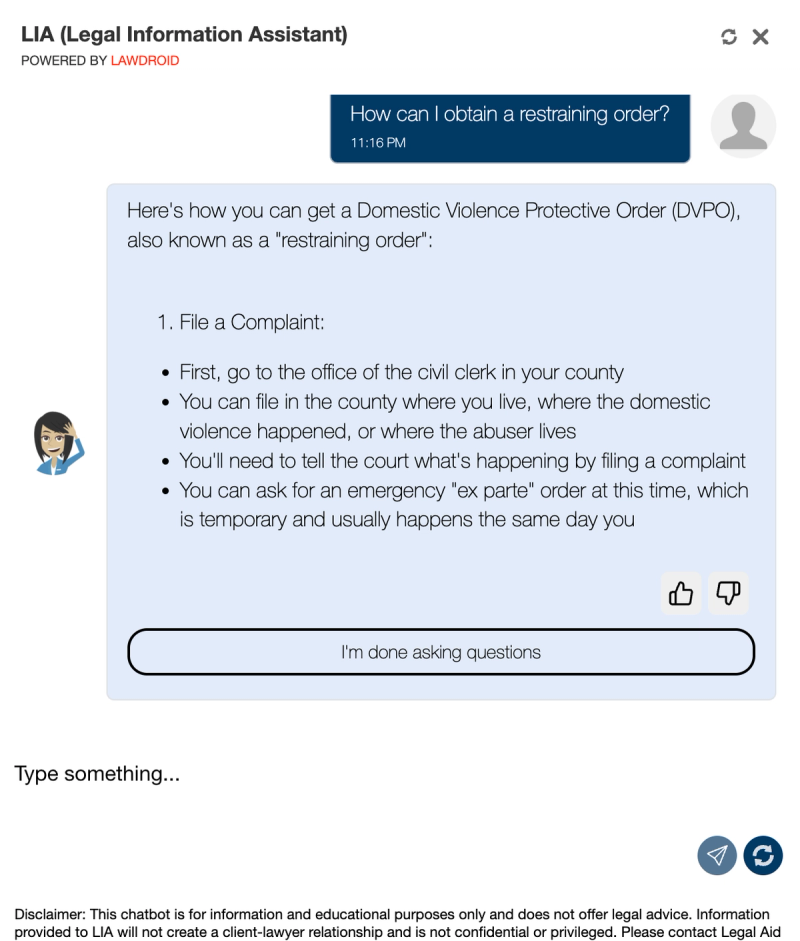LIA

An AI-powered virtual legal assistant from LANC that helps North Carolinians navigate common civil legal problems with plain-language, bilingual guidance and referrals.
Project Description
The Legal Information Assistant (LIA)—pronounced “Leah”—is Legal Aid of North Carolina’s (LANC) AI-powered virtual legal assistant chatbot designed to help the public navigate common civil legal problems. LIA provides 24/7, bilingual, conversational assistance through a chat interface, guiding users through issues like housing, public benefits, family law, and more.
LIA was created to expand access to justice for North Carolinians who face barriers such as limited internet literacy, geographic isolation, or ineligibility for direct legal services. It is funded through a private donation from an Innovation Lab Advisory Board member.
Users interact with LIA via a chatbox on legalaidnc.org. They can choose pre-set prompts (e.g., “What are my rights as a tenant?”) or type in custom questions. LIA responds with structured guidance, highlights key takeaways, and links to relevant self-help resources, clinics, or LANC services. It automatically translates and responds in Spanish, with potential for other languages in the future.
Example Use Cases:
- Tenant eviction scenario: Guidance on options, appeals, and required documents.
- Court preparation: Advice on etiquette, punctuality, and what to bring.
- Spanish query: Handles child custody questions in Spanish.
- Low literacy input: Interprets vague or typo-heavy queries like “I got go cort what i do” and delivers useful guidance.
Why LIA?
Research revealed thousands of North Carolinians face legal problems without ever connecting to an attorney. Many visit LANC’s website after hours. Staff time was consumed by repetitive questions and intake. And many people need basic legal education before escalation to representation.
LIA fills these gaps by offering consistent, accurate, client-friendly information.
Guiding Principles:
- Access First: Prioritize equity in access.
- Client Empowerment: Support self-advocacy, not replacement of human help.
- Transparency & Trust: Clearly disclose AI use and limitations.
- Ethical AI: Ensure privacy, security, and vetted practices.
- Plain Language: Make legal issues understandable and navigable.
Development
LIA was built collaboratively by the LANC Innovation Lab, LawDroid, website developer Priceless Misc, Vanderbilt Law’s AI Law Lab, and LANC’s practice groups, staff, and Client Council.
The process was iterative, with 8 versions refined by feedback and usability testing.
Timeline:
- Fall 2023: User research & interviews.
- Spring 2024: AI integration, curated legal content.
- Winter 2024: Prototype testing with staff, clients, and students.
- July 2024: Public launch on LANC’s website.
- Ongoing: Maintenance, expansion, and new use cases.
Content Creation: Existing LANC self-help resources were converted into Word docs, uploaded into LawDroid’s backend as the knowledge base. Example: disaster relief info post–Hurricane Helene was added within days.
Maintenance
The system is managed by LANC’s Chief Communications Officer and Innovation Lab Program Manager, with practice group content owners ensuring accuracy. Staff update the knowledge base via editable Word documents. Regular reviews align with LANC’s broader materials.
AI Architecture:
- Retrieval-Augmented Generation (RAG) for answers.
- Originally powered by GPT-4o, now Claude Sonnet 3.5.
- LawDroid’s platform is model-agnostic, enabling swaps.
- Closed system: Only curated, internal documents—no open web access.
Limitations & Safeguards
LIA is not a lawyer and cannot provide legal advice. It always displays disclaimers and will answer “I don’t know” if outside its knowledge base.
It avoids hallucinations by only drawing from vetted internal resources, updated by trained staff. Responses come from expert-approved static materials to minimize unauthorized practice of law risks.
Visibility & Feedback
LIA is embedded on the LANC homepage, promoted via outreach, and integrated into staff operations.
Impact so far:
- Over 50,000 conversations in the first year.
- ~3,500 monthly users.
- Most common topics: housing and domestic violence.
- Includes star ratings and feedback options for each session.
Notably, even non-legal queries (e.g., “I’m overwhelmed during my case”) often yield empathetic, highly rated responses.
LIA’s usage data is studied with partners at Duke Law’s Center on Law & Technology and the Digital Safety Research Institute.
Future Expansion
- Broader practice areas and updated guidance.
- Integration into intake & client resource portal.
- Use in clinics, outreach vans, and libraries.
- Improved Spanish content and language parity.
- Voice and mobile optimization.
- Data-driven improvements from anonymized usage.